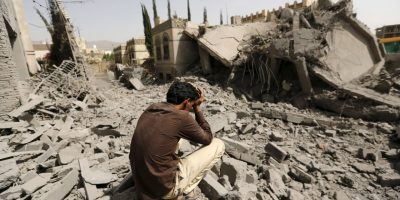U.S. Airstrikes Are Wiping Out Entire Families in Yemen and Syria

The United States is killing entire families in Raqqa, Syria, and enabling Saudi Arabia to do the same in Yemen.
In June of this year, the U.S. led a campaign to retake the city of Raqqa from ISIS fighters while the Russian and Syrian militaries were also attempting to do the same thing. In the first week of fighting, U.N. war crimes investigators warned that the U.S. had already killed 300 civilians from air strikes alone in that seven day period.
Rather than heed that warning, the U.S. has continued the same strategy of pounding Raqqa into the ground despite the likelihood of civilian casualties. Pentagon chief James “Mad Dog” Mattis has dismissed this horror as a mere “fact of life” — a very easy decision to make when the fighting doesn’t concern one’s own relatives. Not to mention that Donald Trump relaxed the rules surrounding air strikes earlier this year, meaning military generals on the ground (including Iraqi forces, for example) can call in airstrikes from the ground with zero oversight.
The result, the Intercept reports, is that entire families are being massacred by U.S.-led air strikes.
“We have seen incidents in which entire families have been wiped out. The scale of things is increasing significantly,” said Alex Hopkins, a researcher at AirWars.
According to Hopkins, there has been a “worrying increase in the rate of mass casualty incidents” in recent weeks, and disproportionate numbers of children are being reported killed in U.S.-led air strikes.
As the Intercept noted, Raqqa is home to very few die-hard ISIS supporters who are fighting to the death to defend its de-facto capital, whereas an estimated 160,000 civilians remain trapped in the crossfire of the city’s fighting.
The Intercept also spoke to witnesses and activists by phone who explained incidents of widespread civilian deaths at the hands of U.S. air strikes. These activists oppose ISIS and are based in Raqqa, according to the Intercept, and their identities remain confidential.
“The planes hit the street where he [father] was walking to go home. There were no ISIS members or headquarters in that street, my father was only 50 meters from home. I wished that he had hurried home that night, but he was too old and it took him time,” one activist said of his father’s death in June.
Drawing on research from Amnesty International and Airwars, the Intercept describes many other instances in which entire families were wiped out:
“For instance, a coalition airstrike in Raqqa City on August 14 killed a mother, Nahla Hamoud Al-Aran al-Shehab, and her three children, Marwa, Ahmed, and Mariam. Three days later, another strike killed 30 members of the al-Sayer family, including several children. On August 21, yet another attack killed eight members of the Al-Aliwi family, internally displaced refugees who had previously fled from fighting in their home city of Palmyra.
“Amnesty International researchers also visited a farmhouse in the Hukumya-Salhiya area northwest of Raqqa, where 14 people were reportedly killed in a coalition attack before the campaign to take the city officially began. Amnesty found fragments of GPS-guided American munitions, and judged that ‘from the pattern of destruction there seems little doubt that the house was destroyed by air strikes.’” [emphasis added]
In its most recent report, Amnesty International also explains a scenario in which one Syrian lost her mother, sisters, nephews and nieces “for no reason at all.”
“The planes were circling all night, and we could not even approach the house to get the two injured children out from under the rubble until the following day,” said another member of the family who witnessed the attack. “The bodies were in shreds. We recovered body parts hundreds of meters away.”
Up until the beginning of June, the U.S. only had two personnel investigating casualties in Iraq and Syria full-time. As the Intercept notes, the U.S. military rarely conducts interviews with survivors and regularly discounts the majority of reports on civilian deaths as “non-credible.” This makes it incredibly difficult to verify the exact number of civilian deaths, but it also demonstrates America’s shockingly non-existent commitment to international law. The U.S. military may boast that it takes the utmost care to protect civilians, but are we just supposed to take their word for it?
Featured image is from FAIR.

